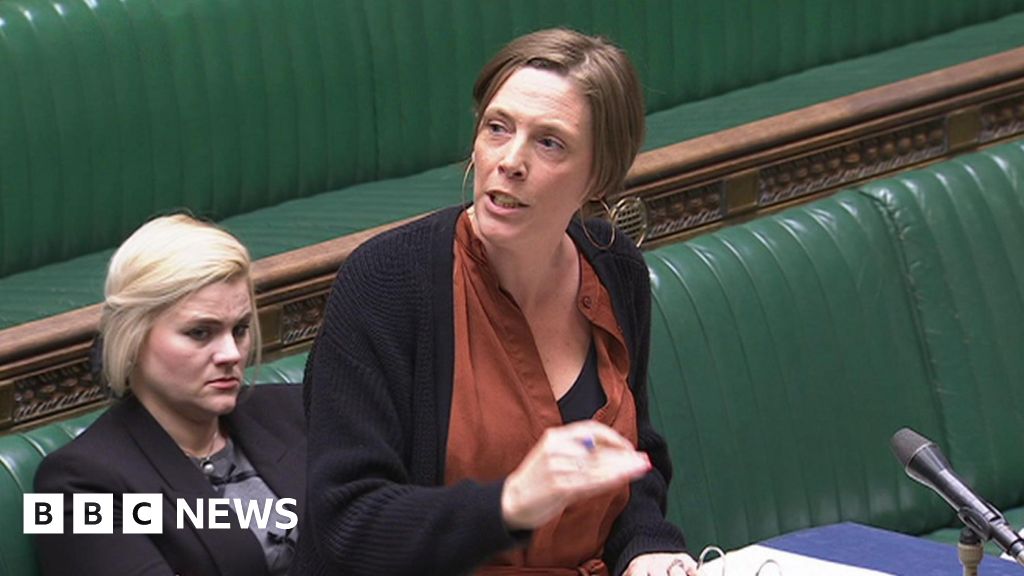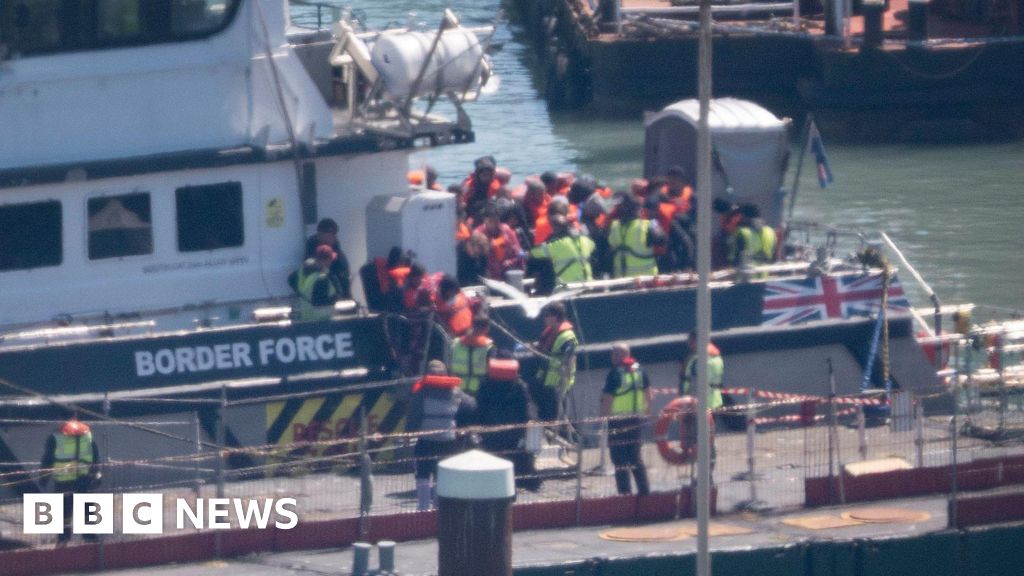ARTICLE AD BOX
By Doug Faulkner
BBC News
Watch: Prime Minister outlines Rwanda immigration plans
Plans to send some asylum seekers who cross the Channel to the UK to live in Rwanda have been described as "absolutely chilling" and "cruel and nasty" by charities and politicians.
The government has faced fierce criticism for the policy with questions raised over costs and impact as well as Rwanda's human rights record.
But Boris Johnson said the £120m pilot scheme would "save countless lives".
The PM said it would break the business model of "vile people smugglers".
The pilot scheme would initially focus mainly on single men arriving on boats or lorries and would see them given a one-way ticket to Rwanda where they would be processed and, if successful, would have long-term accommodation in the African country.
Home Secretary Priti Patel, who travelled to Rwandan capital Kigali to sign the deal, said the "vast majority" of those arriving in the UK "illegally" would be considered for relocation to Rwanda.
The scheme is one of a number of measures announced to tackle small boat crossings in the Channel, with others including plans to hand operational control of the Channel to the Navy and asylum seekers who are resettled in the UK being spread more evenly across authorities.
It has been met with criticism from many quarters, with British Red Cross executive director Zoe Abrams saying the group was "profoundly concerned".
"The financial and human cost will be considerable; evidence from where offshoring has been implemented elsewhere shows it leads to profound human suffering, plus the bill that taxpayers will be asked to foot is likely to be huge," she said.
Enver Solomon, chief executive of the Refugee Council, said the charity was "appalled by the government's cruel and nasty decision" that would "do little" to deter people from coming to the UK.
Labour leader Sir Keir Starmer described the scheme as "unworkable" and "extortionate", claiming it was an attempt to distract from Mr Johnson's "partygate" fine.
The Lib Dems said the government was "slamming the door" in the face of refugees, while the SNP's Ian Blackford described the plan as "absolutely chilling".
Former Ukip and Brexit Party leader Nigel Farage has also criticised the plans, saying they were "not much more than a short-term solution".
He told BBC Radio 4's The World At One programme the problem with sending people away to islands or other countries was "it's not very long before you start to hear tales of abuse" and after that the Human Rights Act could be invoked which "will put a stop to the whole thing".
He said the "only solution" was to follow Australia's example and turn boats around.
The plans have been welcomed by some with a snap YouGov poll showing 35% of those asked supported the proposal, while 42% opposed it.
Recent research by Ipsos Mori suggested 60% of the public were dissatisfied with the government's migration policy - more than half of which cited Channel crossings.
Former UK Border Force chief Tony Smith said it was a "bold move" and may put people off paying people smugglers, when they heard they could be sent to a third country.
'Something's got to give'
- "What's crueller - that or being drowned? If it saves one life, surely it's got to be better than what's happening with these migrants now" - Lorraine, Dartington
- "How are we treating these humans? Are we suddenly saying those coming from Ukraine, their lives are better value than those coming from certain other countries? I think it's abhorrent" - Hamid, Bicester
- "I feel it's a real shame. We seem to have eroded this idea of fairness in our nation. We seem to no longer want to be the nation that wants to help other people. It seems a shame we've lost those values in our country" - Chris, Devon
- "Let's forget about the optics and actually look at the reality. People smugglers will keep trying to find different ways until we break it. That's the cruel part here... I applaud the government for having some backbone" - Martin, Bedford
Concerns have also been raised about the Rwandan government's human rights record and its president, Paul Kagame.
Steve Valdez-Symonds, Amnesty International UK's refugee and migrant rights director, warned sending people seeking asylum in the UK to another country "let alone one with such a dismal human rights record" was "the very height of irresponsibility".
Last year, the UK government expressed concern at the United Nations over "continued restrictions to civil and political rights and media freedom" in Rwanda.
But Mr Johnson described Rwanda as being one of the safest countries in the world and said there was a "risk of stereotyping".
According to a memorandum of understanding between the two governments the UK would screen asylum seekers "without delay" after their arrival in the UK and then provide Rwanda with basic details of each person it wanted to transfer.
Rwanda would have to approve all requests before they were transferred, and the arrangement would last for five years.
After arriving in the east African nation each asylum seeker would be given accommodation and support and would be free to come and go from their accommodation at all times, the memorandum says.
The UK would also resettle "a portion of Rwanda's most vulnerable refugees" in the UK.
Mr Johnson said action was needed to stop people smugglers turning the ocean into a "watery graveyard", and said the British taxpayer could not be asked "to write a blank cheque to cover the costs of anyone who might want to come and live here".
Last year, 28,526 people are known to have crossed in small boats, up from 8,404 in 2020. About 600 people made the crossing on Wednesday - the figure could reach 1,000 a day in coming weeks, Mr Johnson said.
The number of people who could be relocated would be "unlimited", said Mr Johnson.
Rwanda will have the "capacity to resettle tens of thousands of people in the years ahead", including those who have arrived "illegally" since the start of the year, he said.
Image source, Reuters
Image caption,Migrants arriving in Dover after being rescued crossing the Channel
The home secretary said her department had prepared for legal challenges over the deal but she was confident any claims could be successfully contested.
During her visit to Kigali, Ms Patel said the British public had been "crying out for change for the years" and it was "incredibly unfair to the British public to see organisations in their own country effectively just putting blockages after blockages in the way".
Dr Niovi Vavoula, lecturer in migration and security at Queen Mary University School of Law, said she anticipated legal challenges being made under the international principle of non-refoulement - which guarantees no-one can be returned to a country where they would face "torture, cruel, inhuman, or degrading treatment or punishment and other irreparable harm".
BBC home editor Mark Easton, reporting from Rwanda, said ministers would face legal hurdles and substantial costs to launch the scheme.
The BBC has seen accommodation the asylum seekers would be housed in, thought to have enough space for about 100 people at a time and to process up to 500 a year.
Journalists were given a tour of a typical government refugee facility in Rwanda
The Rwandan government said migrants would be "entitled to full protection under Rwandan law, equal access to employment, and enrolment in healthcare and social care services".
The UK Home Office believes existing asylum law will be enough to implement the plan, and Ms Patel said it was not reliant on the Nationality and Borders Bill going through Parliament.
The bill is making its way through Parliament, but time is running out to pass it into law after a series of defeats in the House of Lords.
MPs are currently on a break, but when they return, they are due to review a series of amendments, including one about powers to offshore asylum claims.
Channel Migrants: A dinghy in the English Channel is dwarfed by tankers

 3 years ago
37
3 years ago
37








 English (US) ·
English (US) ·